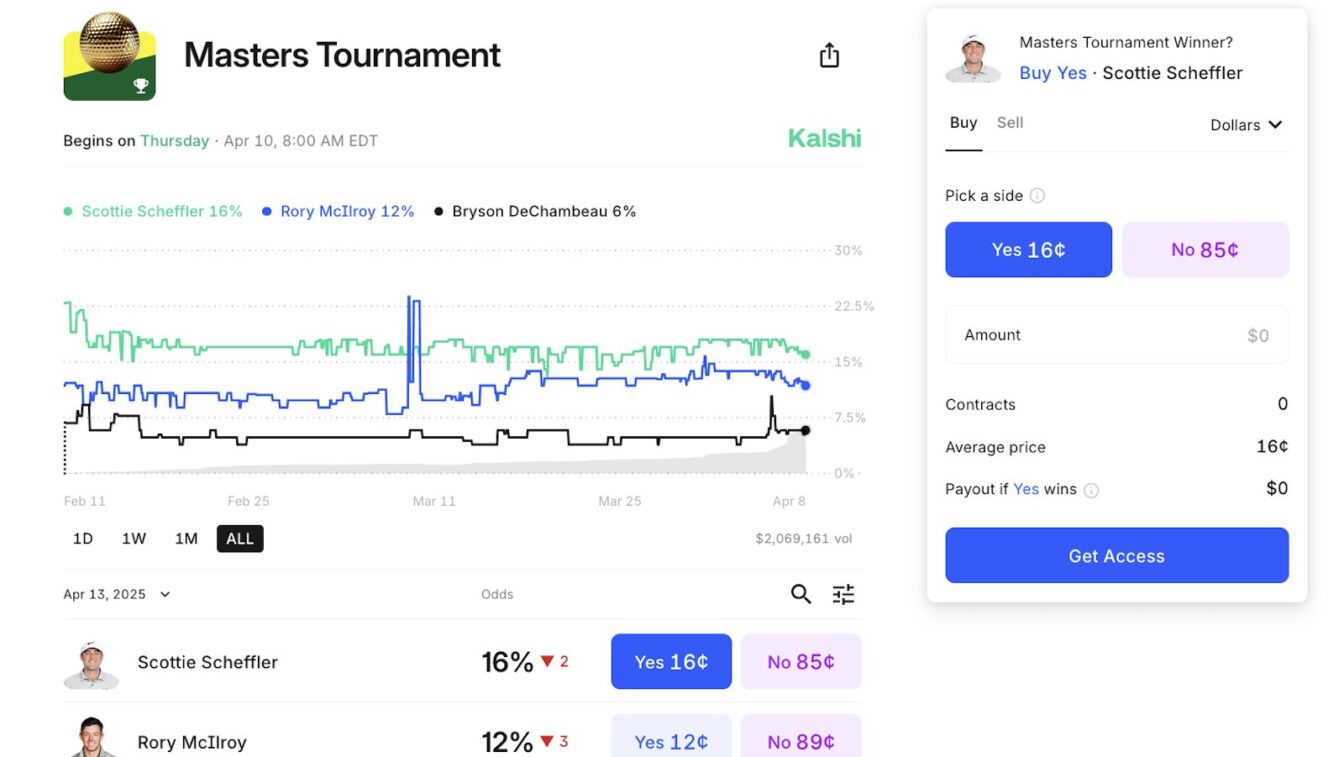Kalshi Stays Live With Sports Markets In Nevada After Winning Injunction, Showing ‘Likelihood Of Success On Merits’ Of Case
It’s game on for The Masters at Kalshi in Nevada and across the U.S.
2 min

U.S. District Court Judge Anthony Gordon provided a detailed ruling that expanded on his decision Tuesday night to grant Kalshi’s motion for a preliminary injunction against the Nevada Gaming Control Board regarding the offering and trading of sporting-event contracts.
“Kalshi has shown a likelihood of success on the merits,” wrote Judge Gordon in the 17-page ruling. “Conversely, the defendants have not shown a likelihood of success on their countermotion for injunctive relief, so I deny their motion.”
It was another legal victory for Kalshi, following a key win in the U.S. Court of Appeals last October over the Commodity Futures Trading Commission (CFTC) that allowed it to offer election-event contracts in the run up to the 2024 U.S. presidential election. The CFTC is currently appealing that decision in the D.C. Circuit Court of Appeals, and a verdict could have an impact on this case.
Gordon’s decision Tuesday night marked the first in a new series of legal filings for Kalshi as the CFTC-registered exchange looks to bat away cease-and-desist orders from multiple state gaming regulatory agencies. Kalshi filed a similar lawsuit in late March in the U.S. District Court in New Jersey against the state’s Division of Gaming Enforcement: The DGE has an April 18 deadline to file its brief, and Kalshi’s reply is due five days later before the sides meet in an April 30 hearing.
Kalshi also has received cease-and-desist letters from gaming regulatory agencies in Illinois, Maryland, Montana, and Ohio, but has yet to pursue any legal filings in those states.
Green: No state agency has sent cease-and-desist letters to trading platforms. Yellow: State agencies are investigating trading platforms. Blue: State agencies have sent cease-and-desist letters to trading platforms. Red: Trading platforms have made legal filings in response to cease-and-desist letters.
What does the ruling mean?
At the very top level, Gordon’s ruling means Kalshi can continue to offer sports-related event contracts in the state of Nevada while the case proceeds. And further it means that the first federal judge to weigh the company’s arguments — that it is federally regulated and therefore not subject to state-level licensing requirements for traditional sportsbooks — was receptive to the arguments.
Wrote Judge Gordon in summary:
Kalshi is, in some sense, proceeding at its own risk and creating its own harms. Things might turn out differently with election contracts if the D.C. Circuit rules against Kalshi or if the CFTC takes action against Kalshi’s sports contracts. But for now, I will preserve the status quo, which is that these contracts are legal under federal law. So requiring Kalshi to stop altogether and lose goodwill or damage its reputation; to spend millions to geofence, which might result in losing its CFTC designation; or to continue doing what it is doing and face civil and criminal liability in Nevada suffices to show a likelihood of irreparable harm for at least a short term injunction. To the extent the States or other interested parties object to Kalshi offering sports and election event contracts, they must take that up with the CFTC and Congress. Such policy issues are beyond the jurisdiction of this court.
Coming off a successful run of trading contracts during the NCAA Tournament — reportedly valued at $500 million following Florida’s victory over Houston in the title game Monday night — Kalshi’s current most popular offering is The Masters, which begins Thursday.
There have been $13.4 million worth of contracts traded for the first golf major, with defending champion Scottie Scheffler and Rory McIlroy the top two picks among traders.
The ruling may also inform Kalshi’s arguments in a District Court in New Jersey, and perhaps also influence the approach by sports wagering regulators in other states looking to challenge the company’s presence in their respective jurisdictions.






